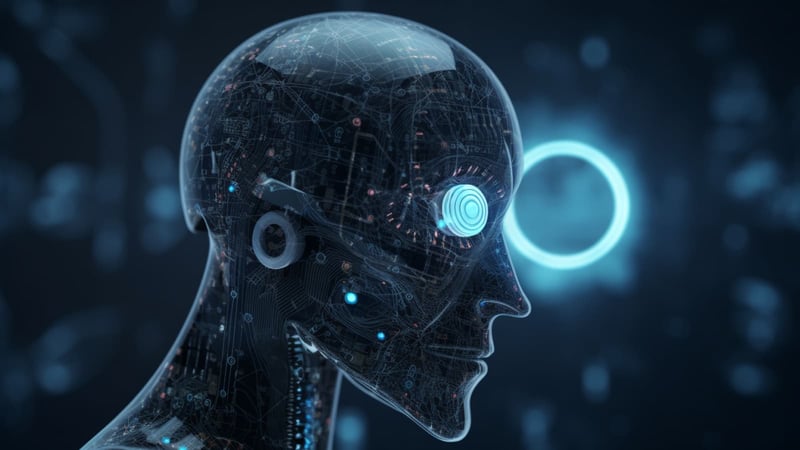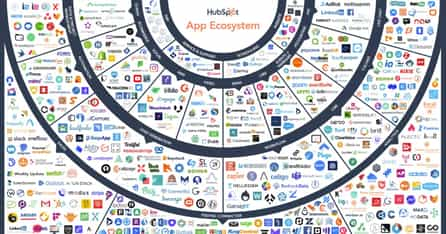Future-Proof SEO: Key Strategies for AI-Powered Search Engines

Technology in 2023 has been dominated by one major trend: the rapid expansion of AI tools into everyday workflows. Since the release of ChatGPT on November 30, 2022, hype, concerns, and implementations of large language models (LLMs) and generative AI tools have spread across the digital marketing landscape.
AI has become integrated into the tools digital marketers use everyday, from Hubspot to Figma to Notion. Microsoft’s Bing became the first search engine to integrate GPT-technology. In response, Google released its new conversational chatbot Bard, then outlined its plans for a new future of AI-powered search at Google I/O 2023 in May 2023.
On the minds of every digital marketer and SEO professional is one big question: How will the growth of AI impact the future of content marketing and SEO? While AI is disrupting all forms of digital marketing, the search experience is particularly ripe for transformation.
As the technology continues to advance, it's important for B2B marketers to understand how AI is changing the game, and what strategies will keep them ahead of the curve. In this blog post, we'll explore the impact of AI on search engines and SEO, and outline the 5 key strategies B2B marketers can use to prepare for the future of AI-powered SEO.
Evolving from traditional search engines
The goal of any search engine is to provide the best answer to a user query. While search engines like Google have traditionally solved that problem by providing a list of links to websites, that format may not always be the best way to provide a solution for the searcher.
But indexing the web and providing semantically-related content, monetized by advertising results at the top, has been the most economically and technologically feasible solution — until now.
The Google search experience has been gradually transitioning from a search engine to an ‘answer engine’ for many years. You may have noticed that some search queries provide a ‘knowledge panel,’ — boxes of information about entities in Google’s Knowledge Graph — or a featured snippet or answer box that provides an answer to a question with no need to visit a website.
The introduction of features like these, and others like carousels and recipe cards, attempts to provide a user experience that more directly addresses user queries.
Answer engines with conversational AI and generative AI search
The growth of voice search through voice assistants led to the transition from search to answer engines, as voice-based queries require a single response. Now, the rise of generative AI will greatly accelerate the further development of this direction of answers over links, by adding an automated conversational experience.
Conversational AI will become a key part of search, as users interact with a chatbot that uses machine learning and natural language processing to better understand the context of user queries and directly answer questions in natural language.
No one knows for sure what the future of search will look like, and how search engines will strike a balance between conversational and generative AI, lists of links to third-party websites, and advertising.
But one thing seems to be certain: AI will accelerate the direction search engines have been already moving, and the user experience of search will continue to evolve and increasingly diversify to provide experiences tailored for specific types of queries and users.
5 key SEO strategies for the future of AI search engines
Organic search is one of the most important — and traditionally the most stable — channels for B2B marketers. So what does AI-powered search mean for the future of SEO? Will content creation for organic search still be a viable strategy for businesses looking to build their brand visibility and attract new leads?
While the rise of AI search engines will lead to a rise in ‘zero-traffic searches’ and lower traffic for certain types of searches (particularly more generic and informational ones that B2B marketers don’t target anyways), this doesn’t mean the end of SEO.
For many queries, especially involving buying decisions, searchers want to read or hear a human’s experience and knowledge, not just an AI summary.
Optimizing for the future of AI-powered search (or answer) engines consists of the same SEO fundamentals we use today: technical optimization, developing backlinks and mentions, identifying keyword phrases, and creating helpful content.
While you may need to make some tweaks, the process will look pretty similar for the near future. Here are five strategies to prepare for the future of AI search:
1. Understand your audience
While understanding your audience has always been important for content and SEO, it’s becoming more important than ever. AI search engines will render generic content valueless, as it will be easy for the AI engine to generate on its own without needing to link out to a third-party website.
AI search engines will also better understand the context of a particular user and their persona through large-scale data analysis, delivering more personalized, tailored results based on the user profile.
This will make it easier to reach highly-relevant audiences if you are properly targeting your content for their particular needs and intent.
You will also need to experiment with new content formats to deliver answers in the manner your particular audience is seeking them. AI-powered search is better able to pull out relevant video and image-based content from social media, which may answer a user query more directly than a text-based webpage.
With content channels evolving, the best way to make sure you’re getting user attention is to closely monitor your audience and best answer their questions in multiple content formats, such as text, video, images, and social media posts.
2. Create unique valuable content
Generative AI makes it easier than ever to create content, but that content is generated based on existing information. As more of this generative content floods the internet, the way to stand out — both to readers and to Google — will be by providing a unique and expert perspective informed by personal experience, which is exactly what AI can’t provide.
You already should be creating ‘E-E-A-T’ (Experience, Expertise, Authoritativeness, and Trustworthiness) content, but this will only become more important. E-E-A-T is shorthand for a set of factors included in Google’s Search Quality Rater Guidelines (the handbook that real people who work for Google use to evaluate the quality of search results).
E-E-A-T was rolled out at the time of Google’s December 2022 Helpful Content update, which aims to penalize content created only for SEO purposes, and reward content made by creators with firsthand experience who are actually trying to help readers (and have the qualifications to do so).
It’s no coincidence that Google added ‘Experience’ shortly after ChatGPT’s launch. Experience is the core differentiator between human and AI-written content, as AI can’t have direct experience of anything. This is increasingly important in a digital world moving towards generative AI content.
3. Proof of "humans" behind the content
In order to differentiate your writing from a sea of AI-generated content, you need to be able to demonstrate there are humans behind the content. As the old adage goes, ‘people buy from people.’ For your content to have a marketing impact, it has to connect with the reader in some way.
Writing from your experience and from a unique angle is an important way to achieve this. But you need to go a step further. Make sure to provide proof of the human creators behind the content, such as an author bio or personal profile. This is important both to connect with readers and for ranking in search.
Evaluating the author or origin of a content piece according to the E-E-A-T criteria is a crucial step Google takes in determining search results, and this is expected to become even more important.
Google’s Knowledge Graph can recognize the ‘entity’ of the content’s author, and connect it to other things online, such as social media profiles, listings in professional directories or appearances at conferences, or authorship of other articles.
At a basic level, be sure to include an author name and preferably a picture. If you do use AI content to supplement your efforts, have a human edit the content, and let readers know that a human has edited the content.
Be upfront about the extent to which a piece of content is human or AI-generated, and edit content to include more human angles to supplement any information pulled from AI.
4. Invest in structured data
Structured data is a standardized format for providing information about a webpage and its content that makes it easier for search engines to understand the content. To describe your site to search engines, you’ll need to add code to your site in the language search engines understand.
Google and other large search engines use a vocabulary called schema.org, which translates content into code they can process, and allows them to display your content in search results in a richer way.
Using structured data is an important step for B2B SEOs and content marketers to improve the way their content is displayed in search results, especially for the SERP features mentioned earlier such as featured snippets, in voice results, etc. To learn more about structured data markup for Google, see the Google Search Central documentation for developers.
5. Focus on visual and voice experience
The rise of voice assistants such as Apple’s Siri, Amazon’s Alexa, and Google Assistant has led to steady growth in voice search queries. While voice search has had its limitations, voice recognition technology is greatly improving with AI advancements, and AI-powered summaries translate far better to voice search than the traditional list of links.
Combine this with users getting more accustomed to using voice assistants for queries, and optimizing for voice search will become a critical component of SEO.
Since voice searches are longer and more conversational, optimizing for voice search requires focusing on natural language processing and doing keyword research for long-tail, conversational queries.
Developing content with a conversational tone can help it translate better to voice search. Use structured data and offer more Q&A’s in your content to help AI tools more easily connect your content to the right queries and user intent.
Another area where AI advancements are having a significant impact is visual search. If a picture is worth a thousand words, AI-powered image recognition technology makes this a reality in the search experience, with tools like Google Lens and Pinterest Lens enabling users to search for products and information with images instead of text.
To be found through visual search, make sure to optimize your images with relevant metadata and ensure that your website’s visual content is easily accessible. Using more visually rich illustrations to support your content will increase your chances.
And be sure to create not just AI-generated but original imagery, as this will give you a better chance of standing out and also helps as a ranking factor in traditional search results.
Search engines are also becoming better at recognizing what images, videos, and audio clips are about, so creating visual, video, and audio content for YouTube and social media platforms is another way to increase your chances of being found.
Just as you should be optimizing your written content with headings and keywords, your visual and video creators will need to think about SEO by optimizing keywords, descriptions, tags, video length, thumbnails, and other factors.
Preparing for the future of SEO
Should you be worried about the future of your SEO efforts after AI? If you’ve invested in quality original content and SEO in the past, you already have a strong starting point for the future of AI-powered search and SEO.
SEO may not look too different in the near future, only requiring some small tweaks and pivots to focus on key areas where AI can’t help — such as in providing a human perspective — or in taking key technical actions, such as optimizing for voice and visuals and using structured data.
Whether you have a solid base of content and SEO or are starting out for the first time, New Perspective is here for you. We've been helping clients increase traffic and drive revenue for almost two decades, and our team of SEO experts is at your disposal.
We’d love to share our expertise and help you navigate the future of SEO. Schedule a free consultation to learn more.




